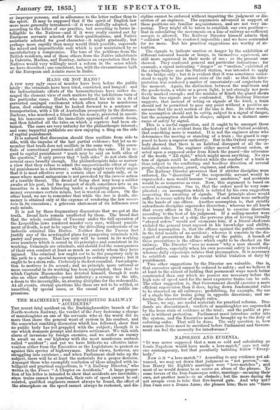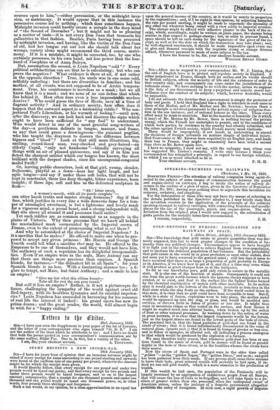NAPOLEON AND EUGENLL
"Iv was never supposed that a man so cold and calculating as Louis Napoleon would have made a love-match," says not only one contemporary, but that peculiarly babbling fellow "Every- body." Now is it "a love-match" ? According to any evidence yet ad- vanced, we may set down that judgment as "not proven,"—un- less Henry the Eighth's marriages were " love-matehes" ' • and most of us would demur to so coarse an abuse of the phrase. To some lovers of the Don-Juanesque order, marriage—meaning their own, not another man's—is an obstacle ; but the more daring de not scruple even to take that five-barred gate. And why not? Don Juan sees a Donna Anna; she pleases him; there axe "three courses open to him,"—either persuasion, or the midnight inva- sion, or matrimony. It would appear that in this instance the persuasive course led to nothing; which does sometimes happen. Midnight invasion could hardly create a scruple in the deep mind of "the Second of December " ; but it might not be so pleasing as a matter of taste—it is not every Don Juan that transacts his gallantries in that fashion. Besides, Paris having been procured by midnight invasion, and having, like the victim of the Don Juan of old, had her tongue cut out lest she should talk about her wrongs, variet), alone might recommend the third course, matri- mony. If it is a mistake, it might be corrected, too, by one who certainly possesses, in his own hand, not less power than the hus:. band of Josephine or of Anna Boleyn. But, assumption the second, is Louis Napoleon " cold " ? Every political arithmetician can see that he is calculating; but who can prove the negative ? What evidence is there at all, if not rather m the opposite direction ? True, his uncle was in one sense cold, Selfishly unfeeling: but there are diversities in families ; and his mother, at all events, was not supposed to be of Arctic tempera- ment. True, his countenance is moveless as a mask; but we all know that it is a mask ; and we none of us can define that which lies behind it. How often does even :a less impenetrable surface deceive? Who could guess the fires of Heels, save at a time of flagrant activity? And in ordinary society, how often does it happen that the outward aspect-is a misleading riddle ? Who con- jectured Peel's Liberalism, or his warmth of feeling?—until now, after the discovery, we can look back and discover the signs which ought to have been sufficient for "any fool" to understand. Who would detect in one of the most graceful song-writers of the day—a gentleman delicate in tongue, manner, and frame, as any that could grace a drawingroom—the puissant pugilist, who has taught the drayman to discern the difference between bigness and " blood" ? Look at that still more illustrious big, smiling, round-faced man, rosy-cheeked and grey-haired--an elderly Cupid, "only not handsome "—blandly surveying all things with an air of pleased quiescence, and say if in him you detect the sharpest satirist which our tongue has known, the most brilliant with the deepest shades, since his uncongenial-congenial model Swift?
Or, leaving public characters, look at that girl, young, slender, frolicsome, playful. as a fawn—bear her light laugh, and her agile tongue—and say if under those soft locks, that will not be kept in constraint, there lies deep thought, bitter experience, keen insight; if those lips, soft and fine -as the delieatest sculpture in flesh-
"Ah ! bitter sweet,
A woman's mouth, with all its pearls complete"—
eon utter harsh truths and master strong formulas ? Say if that face, which justifies in every line a wide domestic fame for a tem- per of unmmgled sweetness, is but a lightsome and lovely mask for a vigorous mind, a proud heart, and a strong independent will, that site above all around it and possesses itself entire?
Yet such riddles are as common amongst us as nuggets in the plains of Victoria. Why then presume that we know all behind the mnstachioed mask surmounted by the Imperial crown of France, even to the extent of pronouncing what is not there ?
And why be astonished at the choice of Imperial Napoleon ? Is it a sacrifice that he makes ? Ile offered to make one when he pro- posed to accept any given princess : Mr. Harris and George the Fourth could tell what a sacrifice that may be. Ile offered to the Emperors to be one of themselves, and they would not have him. The outlawry of such a repulsion has its delightful irresponsibili- ties. Even if an empire were in the scale, Marc Antony can say that there are things more precious than empires. A. Spanish blonde, for instance,—" the delicatest bit in all Spain"; for your Spanish blonde is no less. With a fascinating manner too ; a fi- gure to tempt, not Marc, but Saint Anthony ; and a smile to lose an empire !
"Give me but what this ribbon bound—
Take all the rest the sun goes round."
But will it lose an empire ? Rather, is it not a picturesque de- fiance, challenging the sympathy of the world against cruel old Red-tapery, with its heartless tyrannies and its suicidal impoten- cies ? Louis Napoleon has succeeded in borrowing for his romance of real life the interest it lacked : his grand opera has now its -prima donna ; and the great reader, the world, will almost begin to wish for a "happy ending."



































 Previous page
Previous page